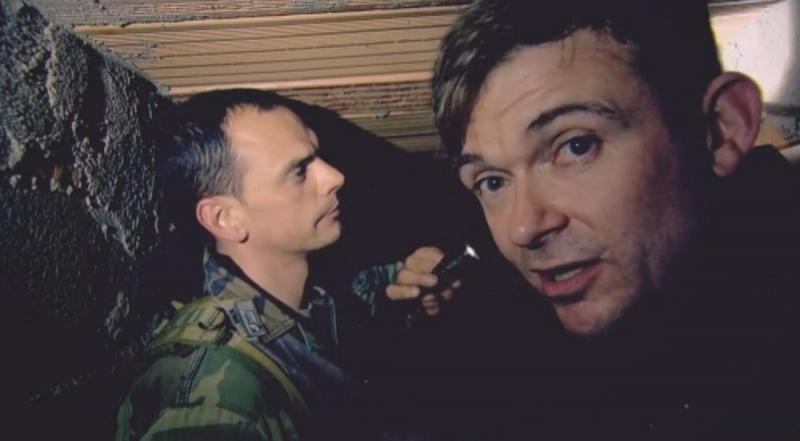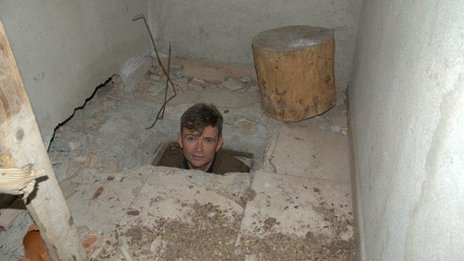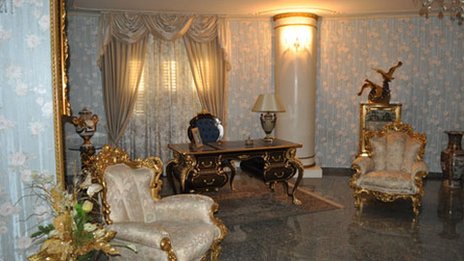The Mafia’s Secret Bunkers, BBC Two | reviews, news & interviews
The Mafia’s Secret Bunkers, BBC Two
The Mafia’s Secret Bunkers, BBC Two
Lack of meaty footage undermines investigation of Calabria's 'Ndrangheta

I was once the summer guest of friends in southern Calabria, where the head of a hapless “family traitor” in the nearby village of Taurianova had been hacked off and then kicked around the piazza like a football: the news was greeted by the locals with no more than raised eyebrows and a resigned shrug of the shoulders.
These things are not often caught on film, and certainly weren’t on offer in The Mafia’s Secret Bunkers. Indeed it’s a good thing that eminent bespectacled academic John Dickie has a good head for heights, as he spends a good deal of this fairly breathless BBC documentary detailing the high octane horrors of Italy’s murkiest Mafia outfit while peering out from the safe distance of the spy hole of an “invisible” police helicopter. He also overlooks some pretty spectacular scenery courtesy of his cash-strapped hosts, the Italian Carabinieri.
 Calabria – which is shaped like a rasher of bacon and stretches from just below Naples (where the Camorra hold sway) down as far as the tip of the boot, a few miles off Sicily (featuring the better known Mafia) - boasts its own peculiarly nasty illegal criminal organisation, the ‘Ndrangheta. Who, as the expression goes, make their Camorra and Mafia neighbours look like pussy cats. Not only for the breathtaking cruelty of their “rules”, but for the broad international sweep of their empire today.
Calabria – which is shaped like a rasher of bacon and stretches from just below Naples (where the Camorra hold sway) down as far as the tip of the boot, a few miles off Sicily (featuring the better known Mafia) - boasts its own peculiarly nasty illegal criminal organisation, the ‘Ndrangheta. Who, as the expression goes, make their Camorra and Mafia neighbours look like pussy cats. Not only for the breathtaking cruelty of their “rules”, but for the broad international sweep of their empire today.
It may be Italy’s poorest, and wildest-looking, region, but Calabria is at the nerve-centre of a vast criminal outreach – centred mostly on drugs and intimidation rackets – across the world, and so it is perhaps surprising that the ‘Ndrangheta is not better known abroad, to the extent that the BBC have fudged their name in the title in favour of the more generic species name.
For an academic, Dickie is rather good on telly, although his natural communicative style is somewhat hampered by the BBC conventions on presenting such documentaries: speaking in an urgent but needless stage whisper, glancing around in a hammed-up, paranoid manner, and generally adopting the conspiratorial style of a (much cheaper) Donald MacIntyre. So too, the complete set of visual tropes from the BBC “moody lighting” toolbox – a good deal of the nasty ‘Ndrangheta’s heroin stash is sited underground, in bunkers and cellars (cue lenses probing down access pipes and tunnels) as the dull, slightly metallic voices of random uniformed Italian drug investigators run through the inventory of “what they got and what we’ve managed to snaffle so far”.
 The schoolboyish Dickie sticks to safer ground, but there’s only so much mean atmos you can stuff into an hour-long documentary, especially without the really grisly footage that the Beeb would never show. Calabrian towns look uniformly grey and dull (or their concrete modern bits do) but not really all that sinister: some of the bling-bedizened, security camera-bristling dream villas built by the hood high-ups to flaunt their wealth don’t really communicate the idea that renegades or kidnap victims may have been tortured in the cellars, just the surface impact of stunning bad taste. (Pictured, a Calabrian house under which police found a 'Ndrangheta bunker.)
The schoolboyish Dickie sticks to safer ground, but there’s only so much mean atmos you can stuff into an hour-long documentary, especially without the really grisly footage that the Beeb would never show. Calabrian towns look uniformly grey and dull (or their concrete modern bits do) but not really all that sinister: some of the bling-bedizened, security camera-bristling dream villas built by the hood high-ups to flaunt their wealth don’t really communicate the idea that renegades or kidnap victims may have been tortured in the cellars, just the surface impact of stunning bad taste. (Pictured, a Calabrian house under which police found a 'Ndrangheta bunker.)
The truly monstrous ethos that the various ‘Ndrangheta families have imposed on some of their “controlled” territories is impossible to convey on screen without authentic footage. Even Donald MacIntyre at his most conspiratorial couldn’t pull that one off, without it.
The future of Arts Journalism
You can stop theartsdesk.com closing!
We urgently need financing to survive. Our fundraising drive has thus far raised £49,000 but we need to reach £100,000 or we will be forced to close. Please contribute here: https://gofund.me/c3f6033d
And if you can forward this information to anyone who might assist, we’d be grateful.

Subscribe to theartsdesk.com
Thank you for continuing to read our work on theartsdesk.com. For unlimited access to every article in its entirety, including our archive of more than 15,000 pieces, we're asking for £5 per month or £40 per year. We feel it's a very good deal, and hope you do too.
To take a subscription now simply click here.
And if you're looking for that extra gift for a friend or family member, why not treat them to a theartsdesk.com gift subscription?
more TV
 Blu-ray: The Sweeney - Series One
Influential and entertaining 1970s police drama, handsomely restored
Blu-ray: The Sweeney - Series One
Influential and entertaining 1970s police drama, handsomely restored
 I Fought the Law, ITVX review - how an 800-year-old law was challenged and changed
Sheridan Smith's raw performance dominates ITV's new docudrama about injustice
I Fought the Law, ITVX review - how an 800-year-old law was challenged and changed
Sheridan Smith's raw performance dominates ITV's new docudrama about injustice
 The Paper, Sky Max review - a spinoff of the US Office worth waiting 20 years for
Perfectly judged recycling of the original's key elements, with a star turn at its heart
The Paper, Sky Max review - a spinoff of the US Office worth waiting 20 years for
Perfectly judged recycling of the original's key elements, with a star turn at its heart
 The Guest, BBC One review - be careful what you wish for
A terrific Eve Myles stars in addictive Welsh mystery
The Guest, BBC One review - be careful what you wish for
A terrific Eve Myles stars in addictive Welsh mystery
 theartsdesk Q&A: Suranne Jones on 'Hostage', power pants and politics
The star and producer talks about taking on the role of Prime Minister, wearing high heels and living in the public eye
theartsdesk Q&A: Suranne Jones on 'Hostage', power pants and politics
The star and producer talks about taking on the role of Prime Minister, wearing high heels and living in the public eye
 King & Conqueror, BBC One review - not many kicks in 1066
Turgid medieval drama leaves viewers in the dark
King & Conqueror, BBC One review - not many kicks in 1066
Turgid medieval drama leaves viewers in the dark
 Hostage, Netflix review - entente not-too-cordiale
Suranne Jones and Julie Delpy cross swords in confused political drama
Hostage, Netflix review - entente not-too-cordiale
Suranne Jones and Julie Delpy cross swords in confused political drama
 In Flight, Channel 4 review - drugs, thugs and Bulgarian gangsters
Katherine Kelly's flight attendant is battling a sea of troubles
In Flight, Channel 4 review - drugs, thugs and Bulgarian gangsters
Katherine Kelly's flight attendant is battling a sea of troubles
 Alien: Earth, Disney+ review - was this interstellar journey really necessary?
Noah Hawley's lavish sci-fi series brings Ridley Scott's monster back home
Alien: Earth, Disney+ review - was this interstellar journey really necessary?
Noah Hawley's lavish sci-fi series brings Ridley Scott's monster back home
 The Count of Monte Cristo, U&Drama review - silly telly for the silly season
Umpteenth incarnation of the Alexandre Dumas novel is no better than it should be
The Count of Monte Cristo, U&Drama review - silly telly for the silly season
Umpteenth incarnation of the Alexandre Dumas novel is no better than it should be
 The Narrow Road to the Deep North, BBC One review - love, death and hell on the Burma railway
Richard Flanagan's prize-winning novel becomes a gruelling TV series
The Narrow Road to the Deep North, BBC One review - love, death and hell on the Burma railway
Richard Flanagan's prize-winning novel becomes a gruelling TV series
 The Waterfront, Netflix review - fish, drugs and rock'n'roll
Kevin Williamson's Carolinas crime saga makes addictive viewing
The Waterfront, Netflix review - fish, drugs and rock'n'roll
Kevin Williamson's Carolinas crime saga makes addictive viewing

Add comment